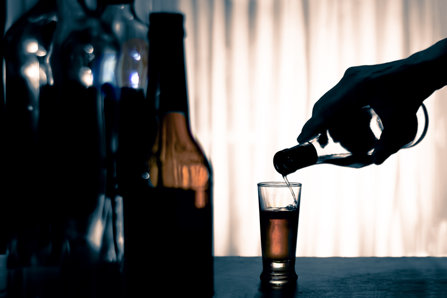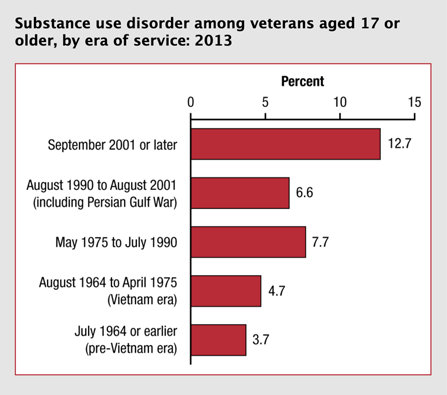Military Personnel at Higher Risk for Alcohol Addiction but with Fewer Options for Treatment

It is in the interest of current and former U.S. service members (and their families) to protect their health and wellbeing. Unfortunately, due to trauma connected to active-duty deployment, combat exposure, injuries, and other factors, service members can fall prey to using drugs and alcohol as a coping mechanism.
To that point, a new study has found that National Guard members and Army Reservists are at heightened risk for alcohol addiction following deployment. Unfortunately, they are also less likely to receive help for alcohol abuse than members of other military branches, putting them at high risk for ongoing substance abuse and addiction.
A Look at the Data
According to a paper published in the Journal of Studies on Alcohol and Drugs, National Guard members and Army Reservists are at heightened risk of misusing alcohol after deployment, particularly if their deployment involved combat operations. Study author Dr. James Griffith, faculty member and research fellow at the National Center for Veterans Studies, stated, “Combat events, such as having engaged in direct combat and experienced combat trauma, may precipitate a great deal of personal discomfort (‘moral injury’), necessitating some form of self-soothing, such as excessive alcohol use.”
“Combat events, such as having engaged in direct combat and experienced combat trauma, may precipitate a great deal of personal discomfort (‘moral injury’), necessitating some form of self-soothing, such as excessive alcohol use.”
Unfortunately, Army Reservists and National Guard members don’t often have access to treatment or support, making their situation even more precarious. Again quoting Dr. Griffith, “Unlike active-duty military personnel, reservists typically do not live near military installations to receive behavioral health care. And many are not eligible for military health care unless conditions are directly related to active-duty military service.”
According to Dr. Griffith’s research, rates of heavy alcohol consumption were higher among soldiers who had deployed than those who hadn’t (30% and 24%, respectively). Further, when Dr. Griffith’s data was compared to other studies on substance abuse within the armed forces, it was found that post-deployment Guardsmen and Reservists had the highest rate of alcohol abuse of all the military branches.

Other Findings on Addiction Within the Armed Forces
Alcohol addiction within the military is a well-studied problem. While Dr. Griffith’s paper does offer new insight and consideration into the problem, there is a fair amount of additional information worth mentioning here.
According to the National Institute on Drug Abuse, alcohol abuse is the most common form of substance abuse among active-duty military personnel. The data shows that 5.4% of personnel are heavy drinkers. While this figure is lower than the 6.7% of civilian Americans who are heavy drinkers, active-duty military personnel engage in binge drinking at rates well above civilians, with some estimates suggesting that as many as one-third of active duty service members binge drink.
The NIDA data also raises the alarm regarding alcohol abuse among veterans. According to the research, 56% of veterans use alcohol, and almost 8% drink to excess, compared to a 50% usage rate and 6.5% drink-to-excess rate for the civilian population. Approximately 65% of veterans who enter drug rehab say that alcohol is their drug of choice, a rate almost double that of the general population.
In a study of 88,235 veterans returning from war in Iraq, researchers found that approximately 12% to 15% of veterans struggled with alcohol abuse within three to six months post-deployment, a rate of substance abuse significantly higher than that of the general population.

Critically, substance abuse is a growing problem for service members, both active duty and veterans. According to the Substance Abuse and Mental Health Services Administration, men and women who served after 2001 misuse drugs and alcohol at a rate of 12%. During the 20th century, however, service members and veterans only misused drugs and alcohol at rates between 3% and 7%.
From the collected research, it seems that people who have served in the armed forces are at a higher risk for alcohol addiction than the general population. Various factors like exposure to combat and what branch of the military one is in can exacerbate the risk factors, with combat-exposed National Guard members and Army Reservists being at the highest risk for alcohol abuse.
Addiction Treatment Is the Solution
Beyond service members, alcohol abuse is a major problem for the general population. According to the National Institute on Alcohol Abuse and Alcoholism, about 95,000 Americans die every year from alcohol-related causes. Alcohol abuse and addiction is a life or death crisis, now one of the leading causes of preventable death in America.
Thankfully, there are solutions for people who struggle with alcohol addiction. Service members shouldn’t put off getting help. Drug and alcohol rehab centers offer evidence-based treatment solutions to help active-duty soldiers and veterans address alcohol addiction and overcome it. If you know someone who needs help, we’re here to help.
Sources:
- https://www.jsad.com/doi/full/10.15288/jsad.2022.83.202
- https://www.usnews.com/news/health-news/articles/2022-03-10/army-reservists-can-face-alcohol-issues-after-deployment-with-little-support
- https://nida.nih.gov/publications/drugfacts/substance-use-military-life
- https://jamanetwork.com/journals/jama/article-abstract/209441
- https://www.samhsa.gov/data/sites/default/files/report_1969/Spotlight-1969.html
- https://www.niaaa.nih.gov/publications/brochures-and-fact-sheets/alcohol-facts-and-statistics
